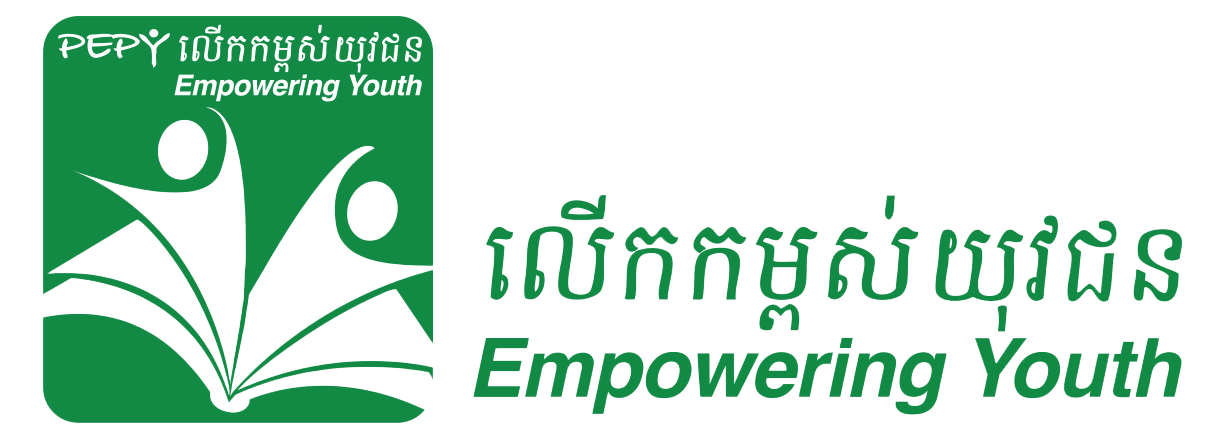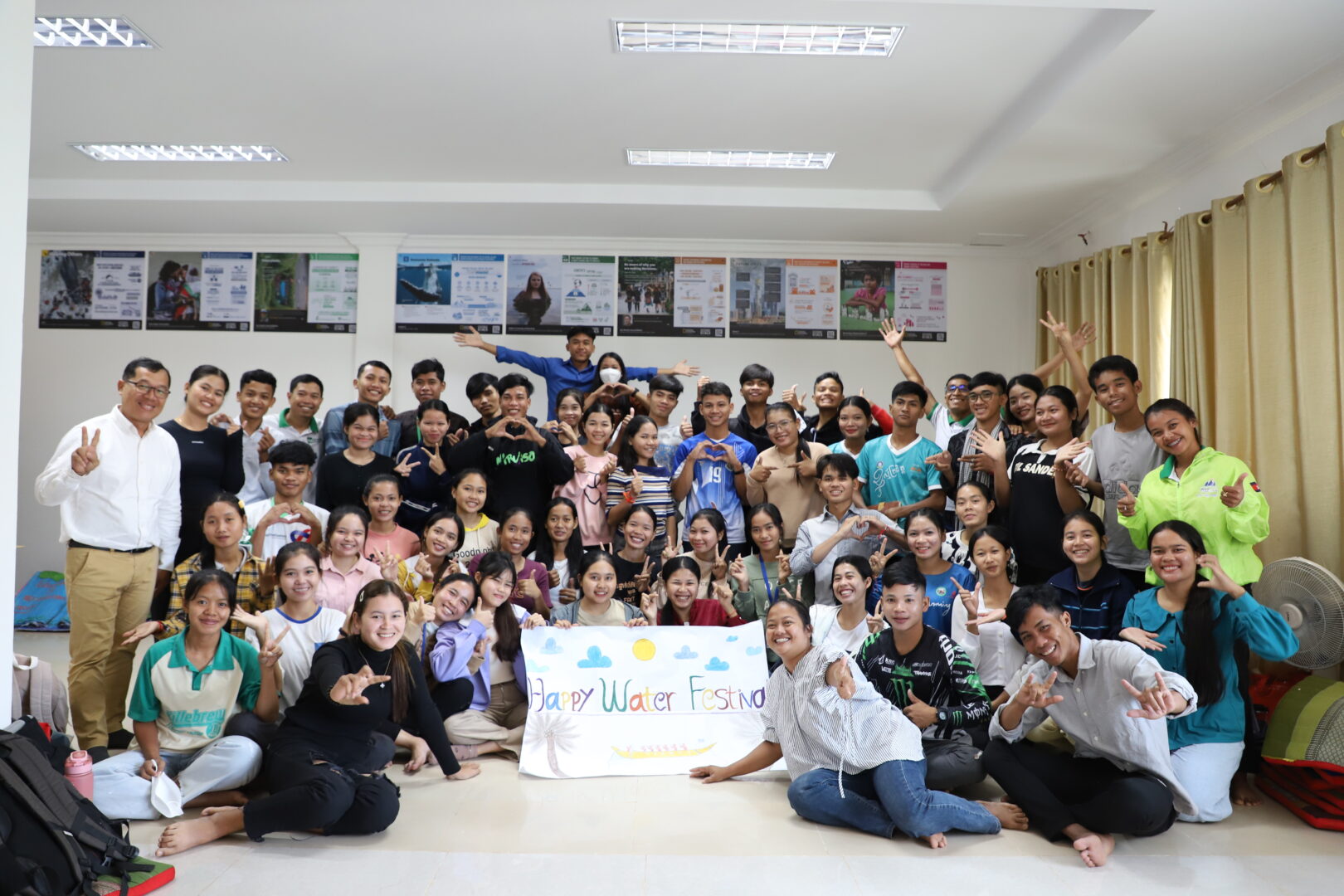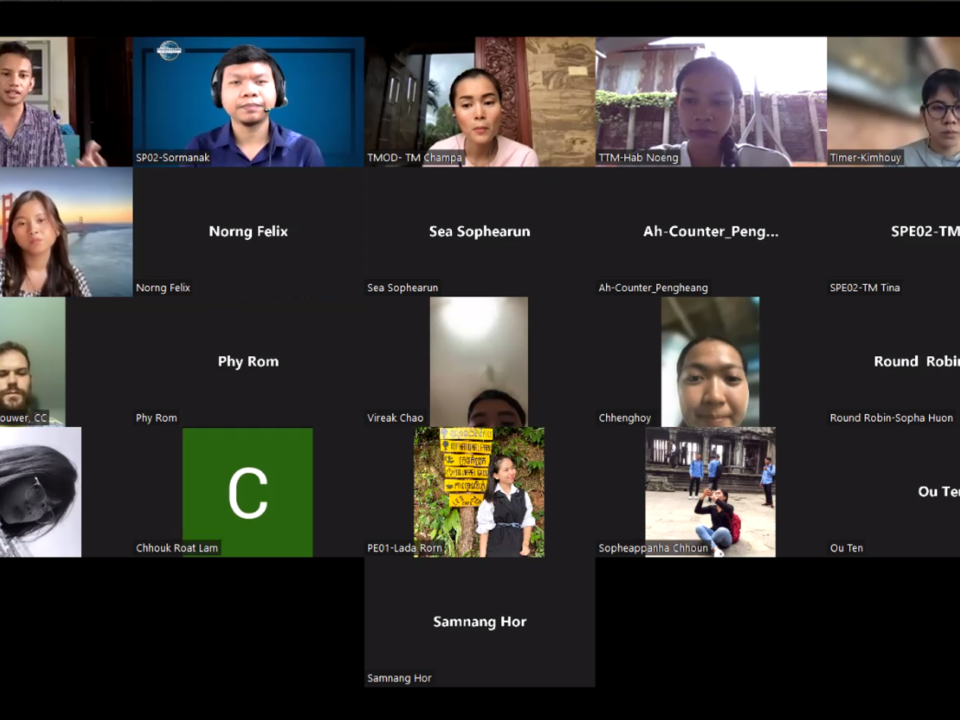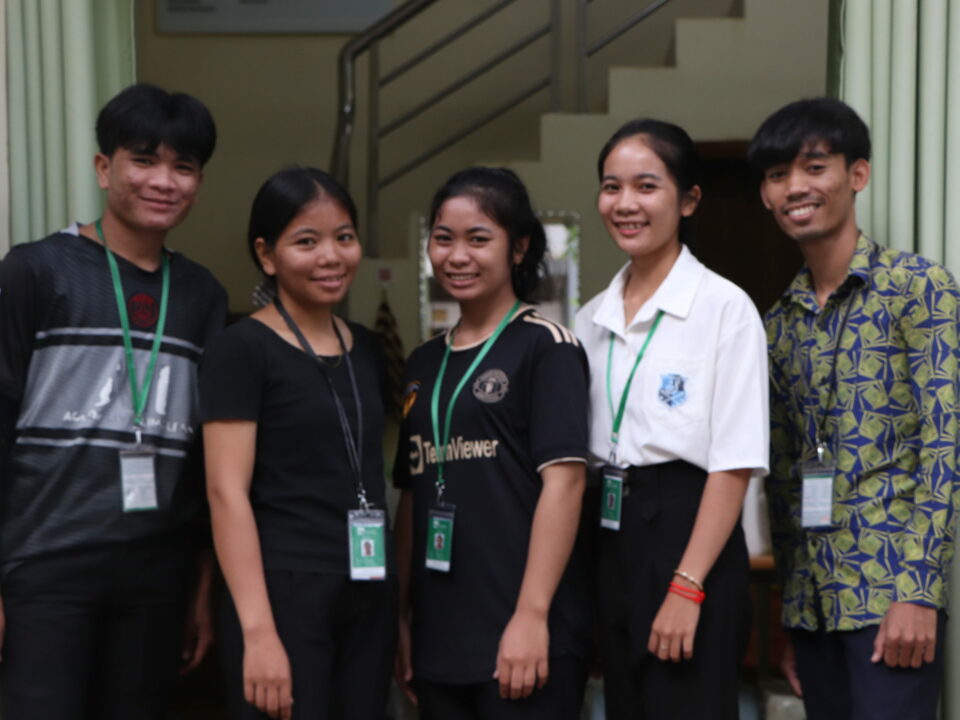Reflections from Natalie Dushney, Golden Week May 2007 Trip Leader
March 27, 2008Shaping the Real World
April 3, 2008They’re not even a real NGO. Aren’t they only registered in the US and Cambodia?
Maryann: Yes, PEPY is an NGO based only in the US and in Cambodia. Actually, we are only based in Cambodia. We have an “office” in the US which is our founder’s home address, only because we are required to by US law in order to be non-profit. Our development work is only in Cambodia, which is where all our staff are located (and all our foreign staff are volunteers, I might add. No one except Cambodians gets paid here including our American Exec. Dir.). This is in contrast to many international organizations that have high stature, but move from place to place never learning the language, meeting the people they serve, or learning from their mistakes. To note that we are only in one place as a negative thing is very misguided. The best development work is local.
Why would PEPY focus on something like teaching Cambodians how to be eco friendly?! They are neither wasteful nor materialistic as a society, nor do they utilize particularly pricey or harmful chemicals or practices while farming.
Maryann: Eco-friendly. Yes, needs are kept to a minimum in Cambodia, though this is almost exclusively because of poverty. However living simply does not always mean living in eco-friendly ways. Anyone who has been to rural Cambodia (or even the cities) cannot help but notice the trash all over the place. In rivers, on the streets, in lakes, etc. Waste management is a huge issue, as trash is typically burned which lets off noxious gases that are quite harmful to health and the environment.
Daniela: People in Cambodia used to wrap everything in banana leaves. Now they wrap things in plastic bags. The kids we meet knew they could throw the banana leaves on the ground, so why can’t they throw the bags too? If no one has addressed bio-degradability or hazardous materials in the air/water, how would they know the difference?
Maryann: Your friend is wrong; they use immense amounts of pesticides and fertilizers. In the participatory rural appraisal we did one month ago, villagers themselves noted that their soil is quite depleted, acknowledging that it is because of the large amounts of fertilizers they use. They want to know how to make organic fertilizers, which they know are better, and to learn composting techniques. They don’t know how, and have asked for help in this area. It’s one thing we are doing in the coming months.
Daniela: Many of these pesticides they buy are actually products which are now illegal in the US and other countries and are now shipped here as, for a profit, those companies don’t seem to care if they are killing people and destroying environments.
Maryann: Deforestation is also a major problem. Because of the poverty in the area, sustainable farming techniques are often not used. The focus is on the here and now, making enough of a crop to feed a family without having the privilege to care about long term consequences. Certainly the West can learn a great deal from developing countries, including how to be happy without the need for material items we think we require. However, people in developing countries just want to be able to survive. This is still a huge problem in Cambodia and one that is not going away with “development”. We have the privilege to judge their simplicity as preferable to our materialism. This is an arrogant view afforded to us by our full stomachs and educated minds. All they want is to be able to make an honest living and not wonder if the next year’s harvest is going to be enough. Development and globalization are making things harder for rural farmers as lands are privatized. We have the ability to help them have cleaner water, decrease the incidence of diarrhea (the biggest killer for children here), help make agriculture more sustainable and productive, increase education about disease, waste management, deforestation, recycling, organic farming etc. Are these not worthy goals when people need and want them?
Why promote the teaching of English? After all, “The quickest way to destroy a culture is to first remove their language”.
Maryann: In terms of our English program: There is no getting around the fact that English is the means of advancement here in Cambodia. With tourism growing, international trade up, business growing, and NGO expansion, English is a prerequisite for most jobs here. It is also the language of many Universities and almost always necessary for admission into university regardless of the language the courses are taught in. We can’t change that about Cambodia.
Daniela: It is also important to note that, originally, PEPY was a one-off bike ride across Cambodia. We searched for an organization supporting education here and found a group building schools. We raised enough money for them initially to build two schools and more and so I moved to Cambodia to see how that money was being spent. The group we were working with built schools and their next step was to bring in an English teacher. So, when we visited the school, we found that there were now kids who had learned to read English but had never been taught to read their own language. We too thought this was horrible, so we separated from the original group, formed our own non-profit, and the first thing we did on our own was hire a librarian and create a Khmer library for the community. We agree that English is not the thing that will improve these kids’ lives the most as their parents need income generating means, their communities need cleaner and safer environments, their soil needs improving for better rice harvests, etc. We are now looking into those areas and have hired Cambodian staff to take this on, as we know they are the ones who need to make these decisions, not us foreigners. But we also didn’t think we should cancel English. We had started it, the kids were loving it, and through English our amazing teacher also had the ability to teach math, environmental lessons, debate, etc. He is also the first college educated person most of these kids have met, and when two years ago kids said their goal was to graduate from 6th grade, many kids now say they want to go to college. It’s not the goal of most English programs, but that indeed to me is a wonderful accomplishment our teacher Tolors has made.
Maryann: We also emphasize Khmer literacy and have a library program stocked with Khmer books, and are constantly working to develop Khmer reading and writing. Unfortunate as it is, English is an enticement to education. It is also a useful skill to have for them to be able to make money.
Daniela: An additional point to note, which I touched on above, is that we are turning our decisions and management over to Cambodian staff. We recognize that development decisions cannot be made across an ocean, and that is why we are HERE. That is why we separated from that first NGO, gave up our careers and jobs at home, and moved here to make sure that the funds we had worked so hard to raise were not being used to cause more harm than good.
Why is PEPY facilitating the introduction of the OLPC $100 laptop? A laptop is not what a poor rural Cambodian schoolchild needs. On top of that, it’s expensive, requires maintenance, will become outdated, AND it’ll require the construction of electricity and telecommunications infrastructures.
Maryann: The laptop, I would encourage you to learn a bit more about. www.laptop.org. It is not a “laptop” in the sense that we understand the world. It is a child’s learning tool, and happens to have a keyboard and look a bit like a laptop. I was very skeptical about the laptop when I heard about, for many of the same reasons I suspect your friend is. I considered that a piece of electronic equipment is the LAST thing that these kids need. Instead, they need clean water, enough food to eat, jobs when they grow up etc. However, I would also include education on that list as a basic need. The laptops do not teach English, or typing, or how to use Excel. Instead, they teach critical thinking skills, logic, team work, math skills through games and activities which were developed by education specialists with a focus on how KIDS think. It is amazing to see the kids use these things—–they are challenging, constantly engaging, and offer them a chance to really be creative- all of which are lacking in the Khmer education system. Yes, we should have a mind towards sustainable solutions which make the Khmer educational system more creative, challenging, engaging etc. But this is a long process and while our programs are focused on making those changes, we are happy to offer some educational alternatives in the meantime. When teachers don’t come to school because the government only pays them 30 dollars a month (far below the poverty line), the kids can’t even begin the learn. If we wait for the government to change, we are waiting too long and the generation growing up now loses the opportunity to learn.
Daniela: These laptops were designed specifically for these kids in developing areas so that THEY can control their education. If their teacher doesn’t show up, which for some is more often than not, the XO provides a means of learning which they can engage in on their own. They were also designed to be totally free of e-waste products, recyclable up to the point where even the internal material in the laptop battery is biodegradable and in fact soil enhancing. I know this seems farfetched, but this laptop is not being designed and marketed like its “competitors” (which are really just small laptops, like “learning tools” as Maryann pointed out) by profit seekers. It was the brainchild of Papert, author of “Mindstorms” who has believed in and lived through experience the importance of childhood education throughout his career. OLPC is a non-profit company and the inventors believe this child-led education approach is the way our education needs to go in the future, both for the developed and underdeveloped world, if we are going to reach universal education goals. I think there are many US schools that could use this type of boost for their education programs just as much as we can here. As a note as well, we have solar panels which power the laptops, which use about 1/50th of the power that a typical laptop uses. They also have the ability to be crank powered, or run off a car battery/generator etc.
Maryann: The OLPC laptop is unique in that is runs entirely off open source software. There are no MNC’s who are benefitting from exclusive contracts, and everything in the computer is open source. They might become outdate in a few years by something better, but the goal here is not to be electronically fashionable, but to find culturally appropriate learning techniques for children.
Cambodia has huge problems, many of them brought about by the Khmer Rouge. How does PEPY address the role that the US and past administrations have played in granting its leaders legitimacy?
Maryann: No one is denying that America was a contributor (if not the cause) of the “success” of the Khmer Rouge and the mass killings that followed them taking power. Yes, you are right, they have huge problems and the US was (and still is) part of the reason for that. Shouldn’t that bolster our argument that doing what we can to help is not only a good thing but a responsibility we should have?
Daniela: Very much agreed. If our country has helped create this, as well as many countries and the UN’s intervention as well, should we not then support the steps forward after so many backwards?
This tour brings participants to a baseball camp! How culturally insensitive and pro-American is that?
Maryann: The baseball camp—no one is preaching baseball or the greatness of America. And, just to clarify, our staff are international, with current and previous interns from Finland, the UK, France, Israel, Canada etc. No one here is talking about the US being a model to aspire to. Most of us have lived abroad and traveled extensively, with an awareness of the problems of American arrogance. The baseball camp was an idea by a partner organization of ours. That will be by no means the only activity that our volunteers “do” there, but it was a theme that the director of that school wanted to include. I can understand an outsider thinking that this is culturally inappropriate, but really, we are talking about kids. We’re not teaching that this is the best game in the world, a particularly American game or anything else. It’s a privileged view to see sport as propaganda in a circumstance like this. There’s no propaganda, we are just playing. They love new games and like all kids, want to be entertained, run around, and have a good time. We have had soccer exchanges, volleyball games, played Khmer games and American games.
Is PEPY actually doing any good for Cambodia?
Maryann: In short, I have shared many of the beliefs of your friend. I am a PhD candidate studying economic development, and have read much of the same literature which argues the points that you friend makes. Since I have started living in Cambodia, my view has shifted dramatically.
Maryann: I hope this is useful in some way. I’d be happy to continue this dialogue with you or your friend. We have not always done things “right” at PEPY and we are happy to acknowledge our mistakes. However our mistakes have never included neglecting the consequences of what we are doing, or matching our good intentions with critically assessing our impact. We are hyper-critical, and anyone who has spent a day in our office will know that our team is constantly questioning the impact we are having, in all of the ways your friend mentioned. Anyone who comes on our trips will be aware of this, and I hope it’s something you will see as well and be able to bring back home to your friends who question PEPY’s effects in Cambodia.
Daniela: If nothing else, I think our biggest accomplishment is being self-critical, and if your friend thinks we haven’t asked ourselves these same questions, she’s wrong. We have. We have, and do, debate the pros and cons of our actions, daily. And we live with the choices we make and we don’t walk away from the mistakes but work to fix them. And we are DOING something about it, not just arguing that development is wrong. We agree that so much of it is, so that is why we are here, living and breathing this daily, and trying to get it right.



